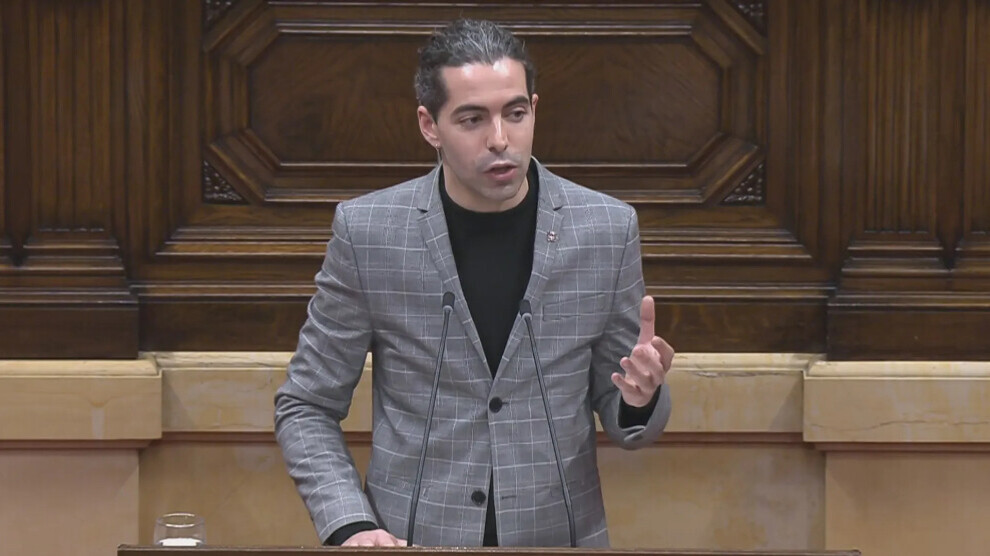Adrià Guevara: HTS is a threat, Rojava model represents the future
Adrià Guevara stated the Damascus government offers no trust for the future, while Rojava is a model to be protected.
Adrià Guevara stated the Damascus government offers no trust for the future, while Rojava is a model to be protected.

The collapse of the Damascus government on December 8 ushered Syria’s political and military dynamics into a new phase. Although several months have passed since these developments, uncertainty still prevails throughout the country. The downfall of the regime did not mark the end of armed conflict, while the international community has begun reaching out to new actors in pursuit of a diplomatic process to construct a “new Syria.”
Hay’at Tahrir al-Sham (HTS), under the leadership of Ahmed al-Sharaa (Al-Jolani), rapidly filled the power vacuum and has shifted its focus toward political positioning. al-Sharaa, once known for his radical armed operations, is now attempting to present himself as a political figure. The group has formed a provisional administration and is currently seeking international legitimacy.
The initial developments during HTS’s rise to power have failed to offer hopeful signs. Reports of massacres targeting Alawite civilians, particularly in the coastal regions of the country, have provoked serious reactions both within Syria and internationally. The silence of the new administration regarding these attacks has cast doubt on the prospects for a peaceful and inclusive future.
On the evening of 29 March, al-Sharaa announced a 23-member “Syrian Interim Government” cabinet under the title of “President.” The announcement drew widespread criticism. The cabinet’s lack of ethnic and sectarian representation exposed HTS’s authoritarian and exclusionary approach to governance.
Experts have pointed out that this style of governance bears strong resemblance to the repressive and centralized system long criticized under the rule of the Damascus government. Hopes within the international community for a genuine political transformation by al-Sharaa are rapidly fading, while the belief that the administration under HTS will fail to deliver a true democratic transition in Syria is gaining ground.
Meanwhile, Turkey and the armed groups it controls, considered the main backers of HTS, continue their occupation of regions governed by the Autonomous Administration of North and East Syria. This ongoing occupation threatens the stability of the Autonomous Administration and further complicates the future of Syria.
Turkey’s occupation in Syria must come to an end
Adrià Guevara, International Relations Secretary of the Republican Left of Catalonia (Esquerra Republicana de Catalunya), shared his views with ANF on the threats facing the Rojava system for the future of Syria.
Guevara underlined that Turkey’s continued occupation of Syrian territory remains a major threat to the future of Rojava. He said, “As a party, we believe that Turkey’s attacks on northeastern Syria amount to acts of war and crimes against humanity. Turkey is pursuing a strategy of occupying a region that does not belong to it, one that belongs to the Kurdish people. We believe this occupation must come to an end. The international community must see the brutality the Turkish state has inflicted across Rojava and stand in solidarity with the Kurdish people.”
The Rojava model offers a guiding vision
Adrià Guevara emphasized that the system being built in Rojava serves as a guiding vision for the future, adding that Syria's path forward depends on such a model. He continued: “We believe the system in Rojava is very strong, because it respects and includes all the different peoples living in the region, culturally and religiously, both majorities and minorities. The practices implemented by the Rojava administration are highly constructive. They are creating the best possible environment for peaceful coexistence among different communities. We believe this is a model that should be observed and followed. We must closely watch what happens in the coming period, and the shifting balances must not harm Rojava.”
HTS inspires no confidence
Guevara underlined that the new government led by HTS in Damascus offers no hope for the future of Syria. He stressed that the international community must approach this process with greater caution. Guevara stated: “The new Syrian government continues to raise concerns for us, because we believe this power has an extremely radical Islamist structure. We are uncertain as to how a government with such a character will evolve, how it will treat the rights of different communities in the country, and how it will protect the rights of regions like Rojava.”
The EU’s stance must change
Guevara said that European countries must take responsibility for protecting Rojava and added: “Many countries remain silent in the face of attacks on Rojava. In Catalonia, we have supported the Kurdish cause for years. In the Catalan Parliament, we have passed numerous declarations in support of the people of Rojava and the Kurdish people. But it is very clear that many European countries have not done the same. I believe the reason for this is Turkey’s considerable influence. There are various agreements between the European Union (EU) and the Turkish government on migration and other issues. This is probably why some major European countries do not openly express their support for the people of Rojava. But this stance must now change. As the Catalan people, we have led by example with our position. These countries should follow us and the decisions we have taken regarding Rojava. We must all stand together for the protection of human rights and the rights of all peoples.”
We are stronger together
In his closing remarks, Adrià Guevara recalled the historical pain and shared struggle of the Catalan and Kurdish peoples. Guevara said, “The Catalan people and the Kurdish people are friends; we are brothers. We are fighting for the same things, for freedom, for the right to self-govern without external interference, and for the protection of our culture and language. We must stand together, because together we are stronger, and being strong is the way to achieve what we are fighting for.”